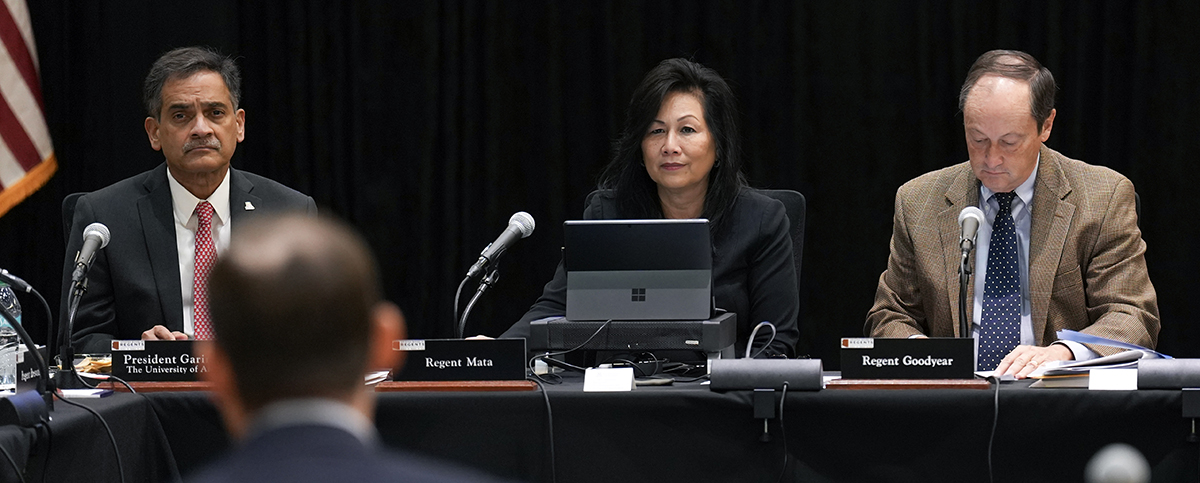
Arizona Board of Regents strengthens commitment to university-defense collaboration
Arizona’s public universities are uniquely positioned to drive national security and economic growth through innovative research
The Arizona Board of Regents announced on Thursday a new initiative aimed at enhancing collaboration with Arizona’s military installations and the U.S. Department of Defense. This effort underscores the board's commitment to strengthening the long-standing partnership between Arizona’s public universities and defense agencies, advancing both state and national security priorities.
Board Chair Cecilia Mata has led statewide conversations with military leaders to understand opportunities and challenges to advance collaboration. “Our state’s public universities are leaders in sectors critical for the military and defense, including cybersecurity, hypersonics, defense technologies, aerospace, workforce development and more,” Mata said. “While the research collaboration between our universities and the defense sector in these areas is significant, there is a growing recognition that the universities have the potential to secure even more funding and partnerships with the Department of Defense and other military entities.”
Presenting to the board at its November meeting in Tucson, vice presidents of research at Arizona State University, Northern Arizona University and the University of Arizona summarized the universities’ existing defense and military-related programs, including research partnerships, federal contracts, education partnerships and veteran services.
“National security challenges are dynamic and complex, and they require focus on mission and outputs. ASU, our sister universities and Arizona are uniquely positioned to support the Department of Defense and other federal security goals around research innovation and education,” said Sally Morton, ASU’s executive vice president of Knowledge Enterprise and head of the university’s research and economic development ecosystem. “Universities play a critical role in our country’s national security ecosystem, and it is essential that we continue to do so. ASU is committed to leveraging our unique capabilities and partnerships to contribute.”
Chair Mata also announced the board's plans to increase board staff capacity to support the initiatives and outlined her strategic focus on defense opportunities. “We need to work together across our universities to support national security,” said Mata. “With increased capacity and focus, we can advance our collaboration, leveraging the exceptional talent at our universities to support defense initiatives. The DOD is always looking for innovative solutions and they look to universities like ours to provide them.”
Arizona ranks eighth nationally in defense spending, presenting more opportunities for the state’s public universities. ASU, NAU and U of A each have played a crucial role in the research and innovation that safeguard national security at home and abroad, and hold even greater potential for future impact, according to university experts that presented to the board.
“NAU has been very intentional in growing our research relationships with a variety of military partners in recognition of unique skills and capacities that our faculty bring to important security issues,” said Jason Wilder, NAU’s vice president for research. “[The collaboration] is highly student engaged. We are really preparing our students to contribute after their graduation with absolutely unparalleled experience.”
Arizona’s public universities already boast impressive research capabilities. ASU with its focus on artificial intelligence and cybersecurity, is actively engaged in research aimed at fortifying U.S. defense against emerging global threats. NAU recently helped spearhead the development of the Supply Chain Critical Infrastructure Risk Management Platform, revolutionizing global supply chain resilience. The U of A top-secret clearance facility allows it to work directly with the DOD on cutting-edge defense technologies.
“I’m truly delighted the board has such an interest in our national security. I think it is a key and imperative for us [to collaborate],” said Tomás Díaz de la Rubia, U of A’s senior vice president of research and innovation. “I believe strongly that state universities in this country have an imperative duty to help solve the great challenges we face in this very dangerous world we live in today. To support our freedom and liberties we so dearly care about, we need all of us to contribute to the solution. The University of Arizona is ready to meet the challenges we face.”
The board and university panelists recognized that these collaborations are not just about enhancing the country’s security, but also will boost student preparedness through specialized skills for in-demand defense careers; empower greater research innovation through student-faculty collaboration; and drive workforce development through diversified industry partnerships to fuel Arizona’s economy.
“By aligning efforts, Arizona’s public universities can make even greater critical contributions to U.S. defense,” said Mata, “with an eye toward long-term solutions that will benefit both Arizona and the nation.”
 Back to Listing
Back to Listing